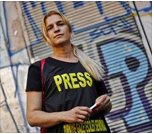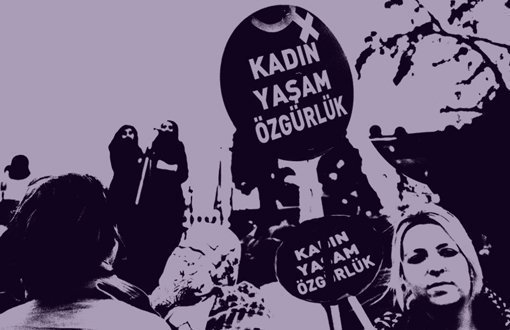Michelle Demishevich is Turkey's first trans TV reporter. Last month, she was hired by IMC TV.
The name "Michelle" comes from the Beatles song. Before she started to live as a woman, Michelle worked as a journalist. But she had to quit her job later on and work at several different jobs including artist assistant at night clubs, manager, administrative clerk, etc. Back then, she noticed the discrimination and started to interrogate it. This is how her journey through journalism to nightlife and activism returned to where it started - journalism.
Certainly, everything was not as easy as that. When she first started working as TV reporter at IMC last month, she has unpleasant experiences with her co-workers at lunch tables or cigarette breaks. "I used to cry every night," she told bianet.
However, she struggled and adapted to her new environment. When we met for the interview, we went to a cafe. Waiters welcomed us with great excitement. We sipped our teas, which were on the house.
"Activism is not about only marching on the streets with flags. What I call activism is my working as TV reporter when other trans people are only depicted negatively by the media. It is important to show that 'others' are also capable of doing meaningful things. Therefore, I decided to march with my flag in the hand. At work, I am just like everyone. My gender identity is out of question. I love my job," Michelle told bianet.
Now, Michelle is preparing for a new "hard talk" program, which will air soon.
You are probably the first trans TV reporter not only in Turkey but also in a broader geography. How do you feel about that?
I have heard of trans columnists but I am the first trans TV reporter in Turkey. This is a great feeling indeed. I work for a TV now, I feel its responsibility on my shoulders. I can't just act spontaneously as I used to. There is a symbolic meaning behind my job as TV reporter. I am trying to pursue a calmer and more naive life. In fact, we have countless gay and lesbian people working at the media sector, but they are afraid to disclose themselves. I guess they are afraid of losing their jobs.
Would you ever imagine this to be possible in Turkey?
Not at all. When I was working as journalist in the 90's, everything was different. Now that I look at it from here, it is so much better. I feel like I am Turkey's (pop star) Madonna.
Do you think the mainstream media will also adapt to the idea?
Mainstream media criticizes a lot, makes you miserable, but loves you at the same time. We experience different things all together. But it is probably hard for a trans woman to work in the mainstream media as reporter, journalist or presenter. There should be, but maybe it is a bit too early. Maybe one day mainstream media will do something similar. Then I will have a rival there! Of course, everybody does their job, if only we only had this kind of rivalries.
Tell us a bit about you. Who is Michelle Demishevich?
Michelle Demishevich was born on July 1, 1999.
How?
Everybody has the same reaction! The old one was born in 1975. But I, Michelle, was born in 1999. Demishevich was my family's name back in Maccedonia. When we arrived here, the [Turkish] state changed our last names along with all other things to assimilate us. Back then, I said to myself, since I am someone new and I will have a new name, I should at least keep my original name.
How was your college years?
I don't want to go back to those days. I graduated from journalism.
What have you done so far to make a living?
I did reporting at Yeni Asır and Egemle Sabah newspapers.
But you weren't Michelle then?
No, it was the one. But that was a transition period to Michelle. I was so handsome, a male beauty. We didn't have cell phones back then, women would give me their phone numbers. When I was working at Yeni Asır, I was a hard worker. I was successful. But things were changing and I lost my job.
Did you lose your job because of your sexual orientation?
If only I kept the letter where they fired me. I was like this then, I got upset. They accused me of harassing a driver. Though I work with a German discipline: I wouldn't even stop for a blink even if I was working with Brad Pitt. I was aware of my sexual identity, but I was hiding it. I was like feminine gay type, but not at work. I was even in a serious relationship [with a woman], just to relieve from gossip. I couldn't even kiss her and she wouldn't understand. She is a fantastic person, we became friends later on and still keep touch. After getting fired, my Istanbul adventure started. As I said, Michelle was born in Istanbul in 1999.
What have you done in Istanbul? Did you work at a newspaper?
No. I was assisting artists in night clubs first. I was in Etiler, I was assisting these artist as a woman! I forgot Izmir and journalism all of a sudden. After working like that for a couple of years, I did some administrative and managing work at other night clubs. Then I worked at Green Party's Thinking Green Association. I am also one of the co-founders of Greens and Left Party of the Future. And now I work at IMC TV.
How did you transition from nightlife to activism and then to Green Party?
I also experienced discrimination in night life business. The ones who called me Ms. Michelle at night would even greet me in the morning. I started to question that. I used to live in Etiler back then and I wouldn't even dare to go to Taksim because of the way they told me about it. I haven't seen a single transvestite in my life. The first one I saw was called Utku. Utku Uysal, a great artist name. Another night I went to Hengame Club and met other transvestites. And I realized that not all of these people's lives were like Utku's. As my questionings went on, I met Demet Demir. That brought more awareness to me. Then one day, I found myself speaking at EU Parliament delivering a speech on LGBT rights. I met Pınar Selek in Strasbourg. She has a huge influence on me regarding my activism history.
How did you start working at IMC TV?
I used to frequent IMC TV as interviewee. Then one day I was chatting with Gülfem Karataş from Mor Bülten (Purple Bulletin) who said "why don't you work here?". I said "no" first. But she kept pushing and asking whether I was sending out my resume and all. I wasn't applying since I thought it wouldn't be possible in Turkey. After another night they hosted me, they asked me whether I would like to work there. They found out that I was a former journalist. This is how my TV reporting adventure started.
It's been a month so far. How is it going?
It was challenging actually. Because you are the other and they always make you feel like that. But you have to be strong. For example, we have common space for eating and smoking. The very first days people were poking each other and pointing me out. Women would go past me and laugh, I had no clue. In my opinion, women should have understood me better. Every time I was going through security, guards were causing issues even though they knew where I was working. The very first 15-20 days, I used to cry every time I got back home. But I made up my mind, I wouldn't give up. Security guards can call my boss every single morning. I love my work environment. I am just like everyone now. My gender identity is out of the question now. I love my job. At first, people were so surprised to see me write scripts and make announcements. I can say that people were astonished to see me as journalist. This is so important for me. I don't want to lose my job due to little mistakes. I get up at 6:30am every morning to go to work.
What kind of feedback do you receive from people?
I first reported from Sirkeci Police Headquarters. Officers were informing other journalists but ignoring me. I asked one of them why he was not responding my questions. I said I was a journalist, too. "Are you kidding me? Can a transvestite be a journalist?" he said. "You could be a cop, I can be journalist too," I said. They were handing out bulletins. They passed one to me as well, probably thinking that I was a lunatic or something. Other journalists ignore me, too. I greet them but they never greet back. There are a handful of journalists who don't hold a distance. I guess the rest will get used to it.
If I face discrimination at work, I cry all night and get back to work the next morning. I don't care, I suffered enough for my identity already. I came to this point by struggling. Nothing can bring me down. I learned how to stop fearing.
There are many communication student with LGBT backgrounds. They might also have certain hesitations regarding their future profession. Do you have anything to tell them?
They should live with their LGBT identity 24/7. They should disclose their identity to their families. Maybe they will be ground or receive a coup. It doesn't matter. When I disclosed myself, my mother cut my hair. But my hair grew back. They shouldn't be afraid, they should struggle for their identity. They should live their identity freely. They should have whatever career they wish. They should be able to become a fireman/MD but keep their LGBT identity. The most important thing is to want it and release fear. The society can never do anything against their willpower. They should say "I am homosexual, not an idiot". They should always be confident.
Education is essential, it builds self-esteem. If you aren't educated, they call you "faggot" on the street, you are forced to work as sex-worker. You don't need to have tons of money, I lived on the street for three months. But finish up your school. If you follow your dreams, they will definitely come true. (ÇT/BM)










.jpg)



